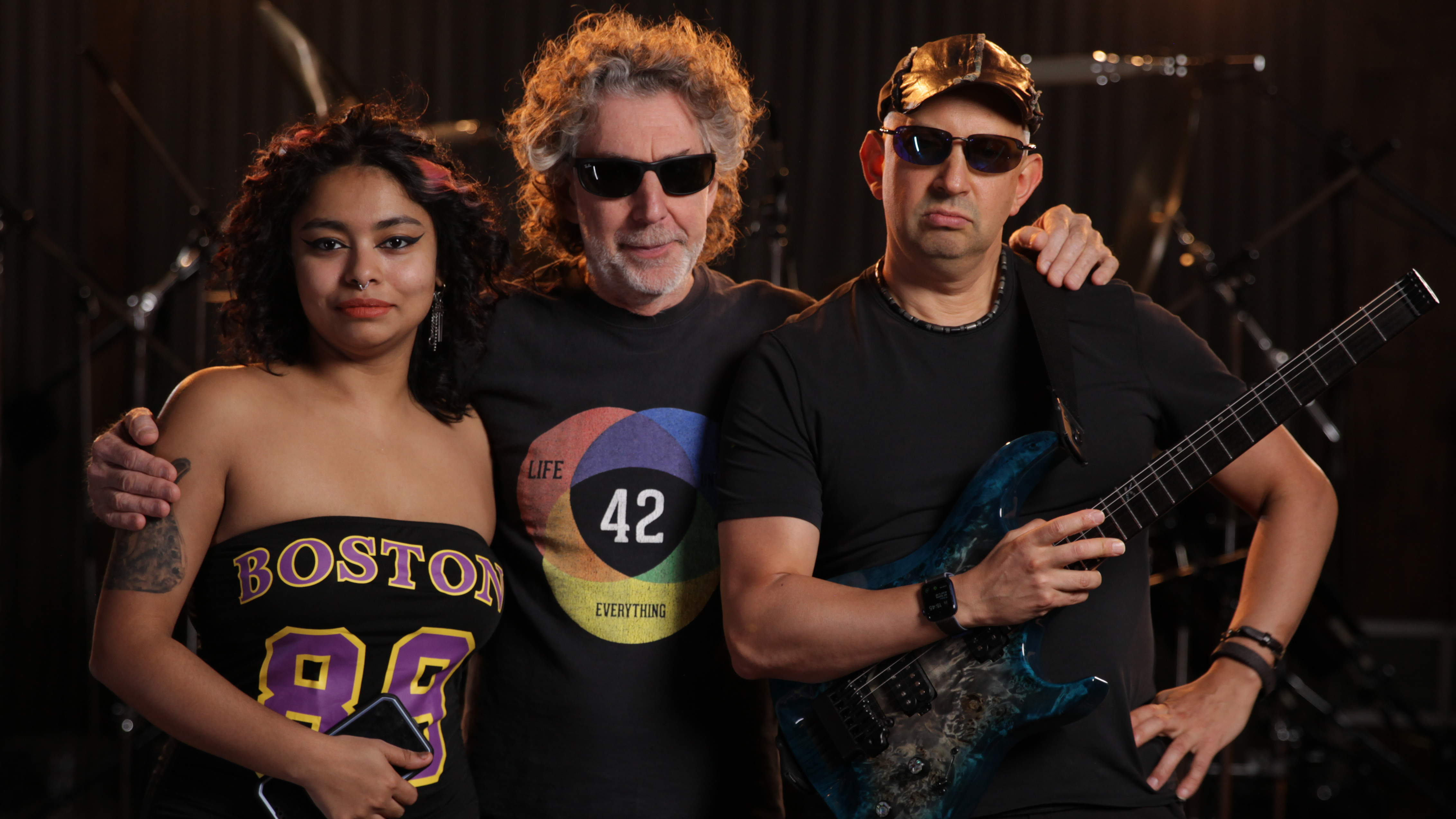“Most pop music is just rubbish now, but we can get back to the way records were made back in the day, which have dynamics, and are pleasurable listens”: Legendary drummer Simon Phillips on his role as producer for progressive rock supergroup DarWin
“I love the sound of records. Good-sounding records”

Want all the hottest music and gear news, reviews, deals, features and more, direct to your inbox? Sign up here.
You are now subscribed
Your newsletter sign-up was successful
Simon Phillips is known throughout the music world as an amazingly ambidextrous musician. He’s also comfortable moving from the drum stool to the producer’s chair, utilising decades-deep technical know-how.
Phillips’ growth both as a musician and engineer began simultaneously in the early ’70s as he entered studio session work at the BBC and beyond.
When the call to join Toto occurred in 1992, Phillips became a US citizen and California resident. He also established his own studio – Phantom Recordings – in LA.
Phillips is also a driving force in the progressive rock supergroup DarWin, whose new album Distorted Mirror has him multi-tasking as drummer, keyboard player, engineer and co-producer.

This new album continues the tradition of superior musicianship and blazing technique from Phillips and other core band members – guitarists DarWin and Greg Howe, bassist Mohini Dey and keyboard player Derek Sherinian.
Singer Matt Bissonette delivers rich vocal harmonies over unexpected odd meter underpinnings like 7/4, 12/4 and 15/4.
Phillips’ crisp drumming and shimmering cymbal accents do not get lost in the mix. Instead, his signature propulsive rhythmic energy shines throughout.
Want all the hottest music and gear news, reviews, deals, features and more, direct to your inbox? Sign up here.
Here, Phillips tells MusicRadar why he is equally comfortable behind a recording desk or his signature double bass Tama drum kit.
You’ve worked with musician and producer DarWin for 10 years now.
“Yeah, we started around 2015, working together. Basically, he asked me to produce his record.
“I'm known as a drummer, and obviously I'm a drummer first. But if anybody asks me, ‘Well, what do you do?’ I say, ‘I make records.’ Because it's something I really love to do.
“I've been engineering for a very long time, I think 43 years now. All thanks to Mike Oldfield, whom I began working with in 1983. He fired his engineer and then brought me on to replace him. Oldfield taught me everything I know about engineering.
“It was something I was always interested in, and that's kind of where my drum sound came from – because I really wanted to learn how to get these drums to project. In a recording scenario, I was often not very happy with the way my drums were being recorded.
“Plus, I love the sound of records. Good-sounding records. I'm fascinated by it.”
So, thanks to Mike Oldfield, your engineering and the drumming took a parallel path?
“Oh, definitely. I started working almost the same amount on engineering as I was drumming. It was quite weird, and it was often kind of a battle, because once you get into a project, which may be recording and then mixing, it can be maybe two months of not playing a drum kit.
“It was tricky, but engineering is something that I really enjoyed, and it also became a profession, too. And out of that, of course, came the production side.
“So really, that's when DarWin approached me. One of his favourite records was [Derek Sherinian's solo LP] Inertia, which I co-produced with Derek, and I engineered that record.
"DarWin heard Inertia, and he thought, ‘I love this – I want to get that sound.’ So out of the blue he sends me an email, and I have no idea who he is!”
Will DarWin ever disclose his real identity?
“No. Absolutely not. Let's put it like this: he's not a leader of a country!”
There's certainly a beautiful clarity in your recordings. And the harmonies sit nicely in the overall mix. There's compression, yet the music still breathes. And, it doesn't feel like things are buried – your drums are right up in the mix, but they're not overpowering. So what is your production style?
“I'm quite old-fashioned. I grew up playing in studios from 1971. In the BBC studios I worked with a lot of older engineers who were engineering records in the ’50s. So, that’s my background, and I would say it’s fairly classically-trained.
“I embrace some of the new methods that we use, but the art of recording has really not changed. It’s still a microphone, a cable, and a mic amplifier. That hasn't changed in nearly 100 years. It's beautiful, and I love all those recordings and how amazing they sound for the time.
“I think one of the best sounding records of that era – the early ’60s – is Chick Corea’s Now He Sings Now He Sobs. It's just a beautiful recording, and there's many, many more.
“I would say my producing idol was Phil Ramone. And I only got to work with him on one album.”
That album was Billy Joel’s The Stranger – and you played on the track Scenes From An Italian Restaurant.
“It was wonderful working with Phil on that album, and that’s the production style I love.
“As a producer, your job is to set up a great atmosphere for the artist and the musicians. Choose the right studio, choose the right musicians, plan it all, then basically just sit and listen.
“That's the thing that Phil would do. We'd just get on with it and make a record, and then if he needed to say something, he'd say something. And I love that approach.
“To me, as a producer, you're not making your solo album with someone else's budget, which is what a lot of producers think. The idea is for you to let artists realise their dreams.
“And how much help they need varies from artist to artist. Somebody like Nik Kershaw, for example, he doesn't really need a lot of help. He's got it all there, it's amazing. But he needs a very good engineer. And he needs a good listener. And I think that's what a producer really should be. So that's the style that I like to go for.
“And from the technical side, I've never liked the ‘volume wars’. It’s absolute rubbish. Sounds awful.
"I don't care about the level on radio. It doesn't matter, because if you're doing pop music, fine. And most of the pop music is just rubbish now. There’s no composition – and about nine people just to think up a few words.
“But we can get back to the way that records were made back in the day, which have dynamics, and are pleasurable listens.”
On the Distorted Mirror album, the opening track Rising Distortion has some wonderful playing from Greg Howe – his guitar lead melodically just keeps ascending. All of the musicians involved in this project share this ability to be equally technical and musical – without compromising in any way.
“It's a wonderful project, and it's such a pleasure to be involved, and to be involved in a major way, too, because at the end of the day it all ends up in my room, in my studio, when I'm mixing it. And that's when it all comes together.
“Then, you've just got to try to create something that has the energy, but also has the dynamics and the clarity. And it's tricky to do, especially with the density of the music. There's a lot of stuff going on there.

“The way we record is a very important issue too. A lot of records these days are made all separately. I think that's disaster for music. You've got to have at least a core group and the core recording needs to be live.
"So, Mohini, DarWin and myself, we go to a studio. DarWin, Matt Bissonette and myself are the composers. And I'm pretty much the chief arranger of the tracks. “Matt's already done all the demo vocals, which we worked with very early on – so we're always listening to the vocals, which is very important.
“I chop stuff around and get very surgical with it, just to make the arrangement work. But then, we go into the studio, and we play. And we will get a live track.
“And that might mean saying things like, ‘Hmm… this needs to be just a couple of clicks faster.’ Which is something that doesn't happen very often in recording these days, because somebody's already recorded their tracks at 120 BPM and then it goes around all these different musicians, and nobody can change the tempo.”
So to be clear – you are using a click?
“Oh yeah, we're using a click, absolutely. It just makes life easier. I don't think there's anything wrong with that.
“But the way I use it, the click is not God, you know? It's just a guide.
“And if I want to lag behind the click, or push in front of the click, that's fine. It's music – it's got to breathe.
“It's so lovely to be able to say, ‘OK, let's speed this up or slow this down a little bit.’ And sometimes when I do sessions for other people, I'm playing the track, and I go, ‘This is not the right tempo for this tune.’
“You know, the sequencer plays anything at any tempo perfectly. Humans don't. So I often will write an email, or pick up the phone, or however, and say, ‘Look, in my opinion this track is not at the right tempo, it's just not sitting. Do you mind if I change the tempo and time expand?’
“The working audio files are not final things. And, nine times out of ten, they will say, ‘Oh, absolutely, go ahead!’
“So I'll change the tempo, and I might try a couple of tempos, and then you know pretty much that the track needs to go two clicks down, or three clicks down.
“Then it’s so much easier to play and and the song breathes. These are the things that you can do instantly when you've got the core trio to make the record with. And I think that's so important.”
Eric Everett is a musician and writer from Cleveland, Ohio, USA. He has worked as a writer and editor for 30 years and has five decades of drumming experience. He is an active performer leading jazz and rhythm & blues bands, and has interviewed many leading musicians including Sheila E., Bernard Purdie, Steven DiStanislao (Crosby/Nash, David Gilmour) and Jonathan Joseph (Jeff Beck).
You must confirm your public display name before commenting
Please logout and then login again, you will then be prompted to enter your display name.



